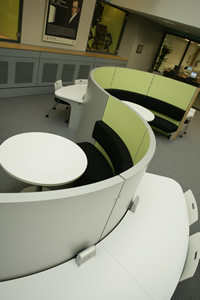e-Valuation Programme
Lead: ALPS e-Valuation Group
Chair: Dr Christine Dearnley, University of Bradford (C.A.Dearnley1@bradford.ac.uk)
The e-Valuation Working Group brings the ALPS Research and IT Groups together with the shared aim of developing research of e-learning pertinent to assessment of health & social care students in practice settings. The e-Valuation group is tasked with leading the evaluation of the following ALPS work streams:
- assessment processes
- e-learning
- developing research relationships with mobile technology suppliers
The e-Valuation Group is currently working on three work streams in order to fulfil its remit as outlined above
STREAM 1
Research Question: How do students perceive that ALPS mobile assessment processes impact upon their learning and assessments in practice settings?
Aim: To investigate the impact of the of the ALPS Mobile Assessment Processes on Learning & Assessment within Practice Settings (i.e. to evaluate the ALPS ASSESSMENT TOOL WITH STUDENTS)
Methods framework:
Focus groups: Students who have been allocated a mobile device and agree to take part in the study
Blogs/diaries: Students who have been allocated a mobile device and agree to take part in the study
Semi-structured interviews: Students who have used their mobile device for a two year period, for a number of functions in addition to the ALPS assessment tools and agreed to take part in the study
STREAM 2
Research Questions: a.How do practice-based staff and university-based staff perceive that the ALPS mobile assessment processes have impacted upon the learning and assessment of students in practice settings?
b. How do practice-based staff and University-based staff perceive that the ALPS mobile assessment processes have impacted upon their practice?
Aim: To evaluate the ALPS Assessment Tool with academic and practice staff.
Methods framework: Semi-Structured Interviews
STREAM 3
Aim: To evaluate the usability and accessibility of mobile devices
Methods framework: Web-based quantitative survey to go to ALL (students and staff) with a mobile device. Builds upon the basic data gathered by the ALPS IT survey which was distributed to all first year ALPS students.
ALPS Paper Tools Evaluation
Lead: Mrs Julie Laxton, University of Leeds. j.c.laxton@leeds.ac.uk
Background: The ALPS CETL programme has developed a generic assessment suite and is piloting with students and their practice assessors. The delivery of this suite of assessment is by mobile devices, thus encouraging immediacy of feedback and reflection by the student. This suite of generic assessment tools is available in a paper format and the three ALPS professions at the University of Leeds are interested in exploring their usefulness without the advantage of mobile technology.
The advantage of using these paper based assessment tools is that they can be integrated more immediately within existing assessment requirements for particular professions.
The paper tools evaluation is being run simultaneously with the e-Valuation programme, and reporting on the two projects will be combined.
Objectives:
- To identify the extent that the ALPS assessment tools generate evidence for the students’ professional development.
- To identify ways in which the assessment tool might be enhanced.
- To investigate the potential role of service users and carers related to the ALPS assessment tools.
ALPS Group Study Area

Lead: Trish Walker, ALPS Core Team. (t.e.walker@leeds.ac.uk)
Background: The aim of this study was to evaluate the use of a newly renovated Group Study Area based in a University library, with the primary goal of establishing which features students liked and disliked.
The refurbishment included:
- installation of study pods (half height walls) to allow for semi-private small group working, including accommodation for individual working with laptops
- a variety of table shapes and sizes (curvilinear, circular, rectangular, etc) on castors
- easy roll chairs on castors
- provision of network points for students to connect own laptops
- large computer screens on swivel arms for group work
- moveable whiteboards
- poster pod providing bench, printing and sticking facilities
- casual seating in the entrance
Data collection was run in two stages:
Stage 1: An exploratory online questionnaire with a mixture of quantitative and qualitative questions
Stage 2: A series of four focus groups
The results from this evaluation are currently being written up and will be made available as soon as the paper is completed. In the meantime if you would like to know more about the ALPS Group Study Area or the evaluation of it, please contact the project lead.
|


